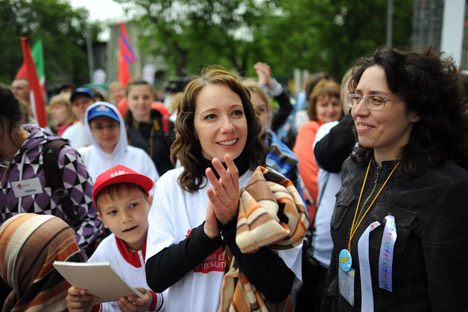
Chulpan Khamatova (L) is a famous actress and a co-founder of Gift of Life fund. Source: ITAR-TASS
Russians’ charitable giving rates decreased by 22 percent last year, compared with the previous year, according to data compiled by the Coutts Institute.
Despite the decreased spending levels, Russia ranks fifth globally in terms of total donations, following the United States, the United Kingdom, China and Hong Kong, the survey found.
U.S. — $13.96 billion
UK – $1.35 billion
China – $1.18 billion
Hong Kong - $877 million
Russia –$236 million
In 2012 Russians spent $239 million on charity, down from the 2011 total of $306 million. Experts said the decrease in funds was not because of a lack of need: Problems of charity are highly acute in Russian, and even today many fail to realize that the government is no longer ready to solve all problems of healthcare and education.
The report accounted only for donations exceeding $1 million. Data for Russia are based on research of 18 charity donors (both individuals and funds).
Individuals made up 71 percent of the total donations in Russia, with the average in 2012 totaled $6.8 million. The largest donation was $65 million.
The overwhelming bulk of charity contributions in 2012 went towards societal development at $75 million (31 percent of the total), followed by donations to charity funds at $54.6 million (23 percent of the total), and to educational establishments at $20.2 million (8 percent of the total).
Moreover, substantial donations were put toward projects outside Russia. Inside the country, the main recipients of charitable funds were non-profit organizations (NPOs). The main areas were enhancement of culture and societal life, solving social-economic problems (such as poverty), and developing science and healthcare. There are presently over 350,000 NPOs in Russia, which are financed through philanthropists, government and private investors.
Philanthropists’ trust still must be earned, according to Ekaterina Chistyakova, head of the Podari Zhizn, or Give Life, fund.
“In 2012 we noticed no substantial outflow of funds, but no growth occurred,” she said. “It remains difficult for many to understand that the government is no longer ready to solve all the problems of healthcare and education. The fact is that necessary medicines can hardly be found in every hospital. We often have to buy them at exaggerated prices due to the new government procurements system. And many people capable of engaging in philanthropy don’t hide, but rather instinctively sidestep these problems.”
And yet, the report’s authors stressed that actual spending on charity could be much higher. Many seek not to broadcast their philanthropic activities. Forbes magazine could partially bridge the gap. The magazine polled billionaires from their Top 50 list and eight Russian oligarchs acknowledged that in 2012 they personally spent $390 million on charity.
The government acknowledges the importance of individual participation in charity and seeks to create favorable conditions. Specifically, since 2007 the profit tax was repealed on earnings from funds’ target capital, while entities and organizations creating endowment funds receive tax benefits. Ratified in January 2012 were amendments to the Tax code for the provision of tax exemptions for individuals participating in philanthropic activity. The statute has been in effect since 2013.
Despite the activities of private philanthropists, the distinguishing feature of charity activity in Russia was institutional charity evidenced by the creation of funds. In 1999 Vladimir Potanin established Russia’s first private charity fund for the implementation of large-scale programs in the educational and cultural spheres. Since then, the number of corporate and private funds has consistently grown.
As of 2013, Russia has around 70 private funds. Total contributions from the largest of these exceed $10 million annually. Several wealthy Russians have founded private funds outside the country, while contributions from such funds are put toward Russian charitable aims. Although many Russian donors primarily support NPOs, charitable funds often implement programs with their own resources: constructing schools, rebuilding hospitals, developing palliative aid or book publishing. This is partially explained by the funds’ desire to control, at least in part, the progress of program implementation.
First published in Russian in Gazeta.ru.
All rights reserved by Rossiyskaya Gazeta.
Subscribe
to our newsletter!
Get the week's best stories straight to your inbox